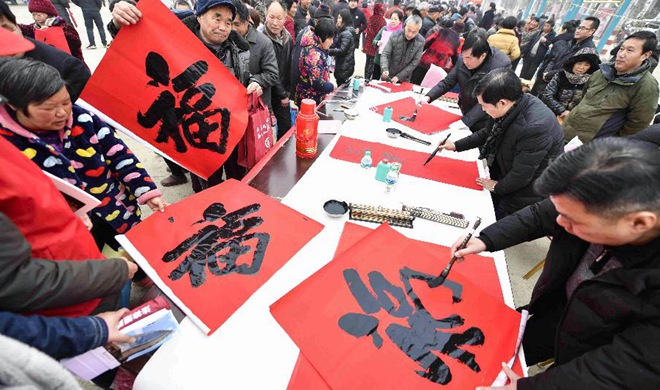BEIJING, Jan. 18 (Xinhua) -- China's property market remained largely stable in December with house prices edging down slightly in major cities amid tough purchase restrictions, the National Bureau of Statistics (NBS) said Thursday.
On a monthly basis, new residential housing prices in first-tier cities stayed unchanged in December from November, and second-hand house prices went down 0.1 percent.
In contrast, the property market in second- and third-tier cities is showing signs of picking up, with new residential housing prices gaining 0.6 percent and 0.5 percent, respectively, from a month earlier, NBS data showed.
New residential home prices went down on a yearly basis in nine of the 15 major cities, considered the "hottest markets." On a month-on-month basis, new residential housing prices fell in four of the 15 cities, while Beijing, Hangzhou and Hefei saw prices flat with November.
NBS statistician Liu Jianwei said that housing prices stayed generally stable in major cities as differentiated control policies continued to take effect.
The data provides evidence that government cooling measures to prevent asset bubbles in the property market are working.
China's housing market last year had a red hot start with soaring prices in some major cities, but ended on a cool note after local governments rolled out a string of restrictive measures echoing the central government's call that "housing is for living in, not for speculation."
About 110 cities and government agencies introduced more than 270 restrictions to tame the housing market, with Beijing implementing over 30 cooling policies, according to Centaline Property.
Due to the broad efforts, both investment and sales in China's property sector slowed in the first 11 months. Real estate investment rose 7.5 percent year-on-year during January-November period, down from 7.8 percent in the first 10 months.
A statement released after the Central Economic Work Conference last December said that China would maintain policy consistency and continuity and adopt differentiated property policies in 2018.
"The consistency and stability of China's property regulatory policy is of vital importance to the sound and steady development of the property sector as well as preventing risks," said Liu Hongyu, head of the real estate research institute at Tsinghua University.
Policymakers agreed that China needs to foster a "long-term mechanism" for real estate regulation, and a housing system that ensures supply through multiple sources and encourages both housing purchases and rentals.
In large and medium-sized cities, the government will step up the development of housing rental market, especially long-term leases. Meanwhile, reducing unsold housing will still be a priority for third- and fourth-tier cities and counties.
"Different policies on different housing will support first-home buyers and upgraders in China and speculation will be curbed in 2018," said Wang Menghui, minister of housing and urban-rural development.
"Meanwhile, the long-term mechanism should also include increased land supply and a sound housing finance system, real estate tax system and urbanization infrastructure construction," Liu Hongyu said.

















